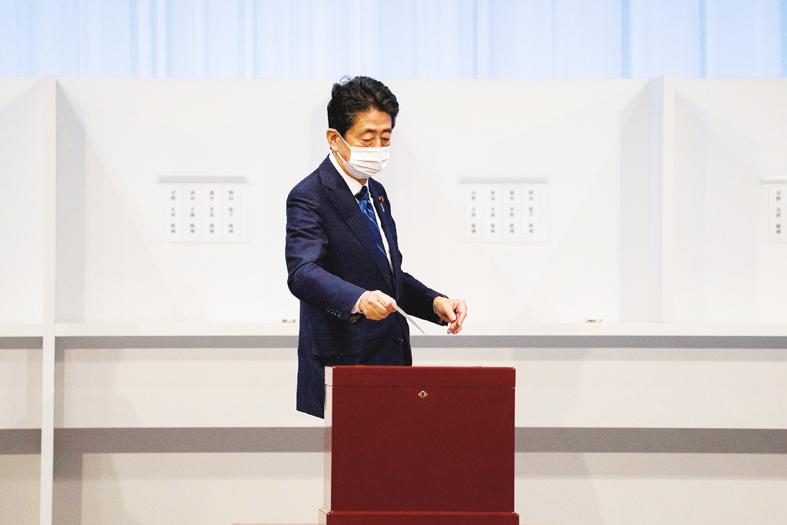China has reacted angrily to a call by former Japanese prime minister Shinzo Abe for Tokyo to consider hosting US nuclear weapons in the wake of Russia’s invasion of Ukraine and rising concern over Chinese aggression toward Taiwan.
Abe, who presided over record defense budgets before resigning in 2020, said Japan should cast off taboos surrounding its possession of nuclear weapons following the outbreak of war in Europe.
“In NATO, Germany, Belgium, the Netherlands and Italy take part in nuclear sharing, hosting American nuclear weapons,” Abe said in a TV interview, Nikkei Asia reported. “We need to understand how security is maintained around the world and not consider it taboo to have an open discussion. We should firmly consider various options when we talk about how we can protect Japan and the lives of its people in this reality.”

Photo: Reuters
Japan, the only nation to have been attacked with nuclear weapons, in Hiroshima and Nagasaki, is part of the US nuclear umbrella, but has for decades adhered to three non-nuclear principles — that it will not produce or possess nuclear weapons or allow them on its territory.
Japanese Prime Minister Fumio Kishida quickly rejected Abe’s call for a debate on the nuclear-sharing option.
“It is unacceptable given our country’s stance of maintaining the three non-nuclear principles,” Kishida, who represents a constituency in Hiroshima, told lawmakers this week.
“Japanese politicians have frequently spread fallacies related to Taiwan and even blatantly made false remarks that violate the nation’s three non-nuclear principles,” Chinese Ministry of Foreign Affairs spokesman Wang Wenbin (汪文斌) told reporters in Beijing.
“We strongly ask Japan to deeply reflect on its history,” Wang said, adding that Tokyo should “be cautious in words and deeds on the Taiwan issue to stop provoking trouble.”
Abe, a conservative whose lifelong political ambition is to revise Japan’s “pacifist” constitution, said any conflict involving China and Taiwan would also constitute an emergency for Japan.
He called on the US to end its “ambiguity” on the defense of Taiwan, noting that it is just 110km from Yonaguni, Japan’s westernmost inhabited island.
“The US takes a strategy of ambiguity, meaning it may or may not intervene militarily if Taiwan is attacked,” Abe said. “By showing it may intervene, it keeps China in check, but by leaving open the possibility that it may not intervene, it makes sure that the Taiwanese forces for independence do not get out of control.”
Abe, leader of the biggest faction in Kishida’s ruling Liberal Democratic Party, has made several hawkish interventions on security policy that enjoy support inside the party, but could provoke a backlash among voters nervous about Japan’s potential involvement in regional conflicts.
China’s state-run Global Times accused Abe of attempting to “unlock” Japanese militarism.
“It is not only ironic, but also a huge real risk, that a group of people in the only country in the world that was bombed by atomic bombs would call for an invitation to the culprit to deploy nuclear weapons in their own territory,” it said in an editorial.

SECURITY: As China is ‘reshaping’ Hong Kong’s population, Taiwan must raise the eligibility threshold for applications from Hong Kongers, Chiu Chui-cheng said When Hong Kong and Macau citizens apply for residency in Taiwan, it would be under a new category that includes a “national security observation period,” Mainland Affairs Council (MAC) Minister Chiu Chui-cheng (邱垂正) said yesterday. President William Lai (賴清德) on March 13 announced 17 strategies to counter China’s aggression toward Taiwan, including incorporating national security considerations into the review process for residency applications from Hong Kong and Macau citizens. The situation in Hong Kong is constantly changing, Chiu said to media yesterday on the sidelines of the Taipei Technology Run hosted by the Taipei Neihu Technology Park Development Association. With

A US Marine Corps regiment equipped with Naval Strike Missiles (NSM) is set to participate in the upcoming Balikatan 25 exercise in the Luzon Strait, marking the system’s first-ever deployment in the Philippines. US and Philippine officials have separately confirmed that the Navy Marine Expeditionary Ship Interdiction System (NMESIS) — the mobile launch platform for the Naval Strike Missile — would take part in the joint exercise. The missiles are being deployed to “a strategic first island chain chokepoint” in the waters between Taiwan proper and the Philippines, US-based Naval News reported. “The Luzon Strait and Bashi Channel represent a critical access

‘FORM OF PROTEST’: The German Institute Taipei said it was ‘shocked’ to see Nazi symbolism used in connection with political aims as it condemned the incident Sung Chien-liang (宋建樑), who led efforts to recall Democratic Progressive Party (DPP) Legislator Lee Kun-cheng (李坤城), was released on bail of NT$80,000 yesterday amid an outcry over a Nazi armband he wore to questioning the night before. Sung arrived at the New Taipei City District Prosecutors’ Office for questioning in a recall petition forgery case on Tuesday night wearing a red armband bearing a swastika, carrying a copy of Adolf Hitler’s Mein Kampf and giving a Nazi salute. Sung left the building at 1:15am without the armband and apparently covering the book with a coat. This is a serious international scandal and Chinese

COUNTERINTELLIGENCE TRAINING: The ministry said 87.5 percent of the apprehended Chinese agents were reported by service members they tried to lure into becoming spies Taiwanese organized crime, illegal money lenders, temples and civic groups are complicit in Beijing’s infiltration of the armed forces, the Ministry of National Defense (MND) said in a report yesterday. Retired service members who had been turned to Beijing’s cause mainly relied on those channels to infiltrate the Taiwanese military, according to the report to be submitted to lawmakers ahead of tomorrow’s hearing on Chinese espionage in the military. Chinese intelligence typically used blackmail, Internet-based communications, bribery or debts to loan sharks to leverage active service personnel to do its bidding, it said. China’s main goals are to collect intelligence, and develop a